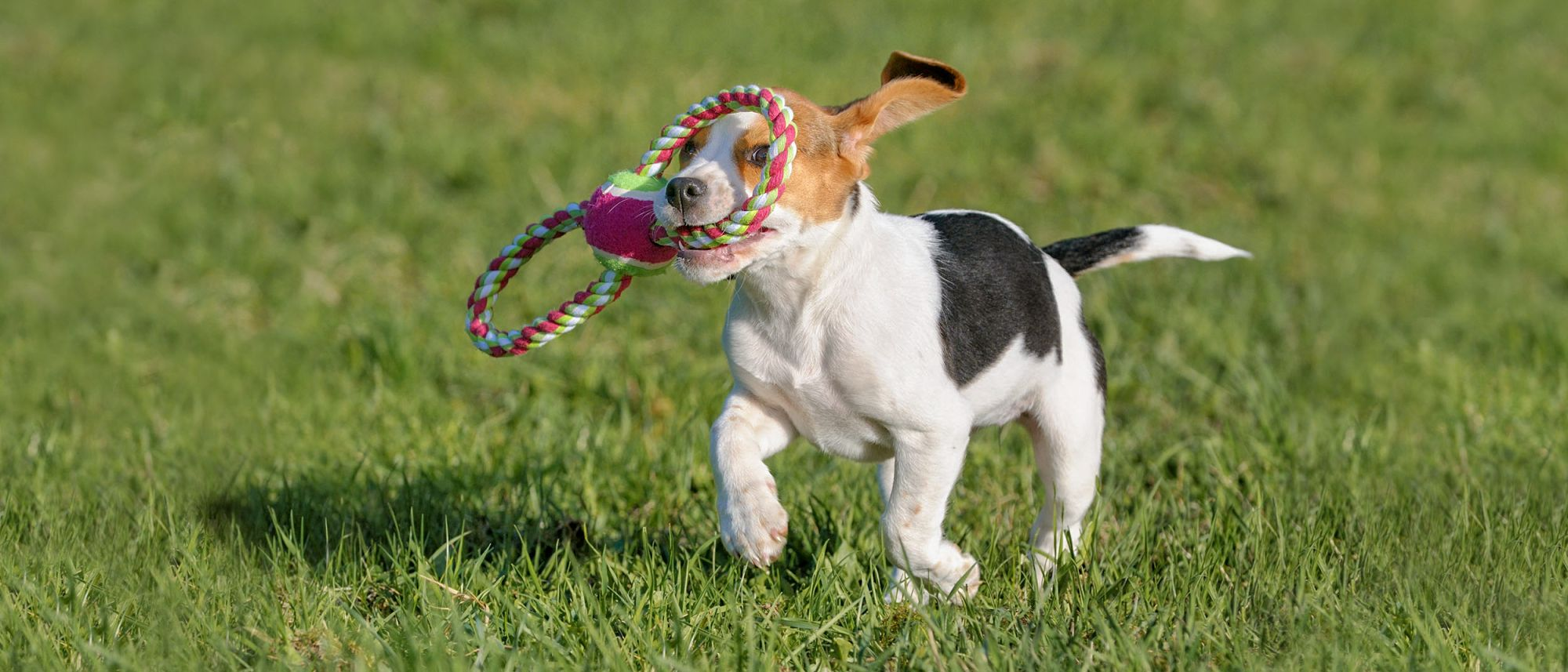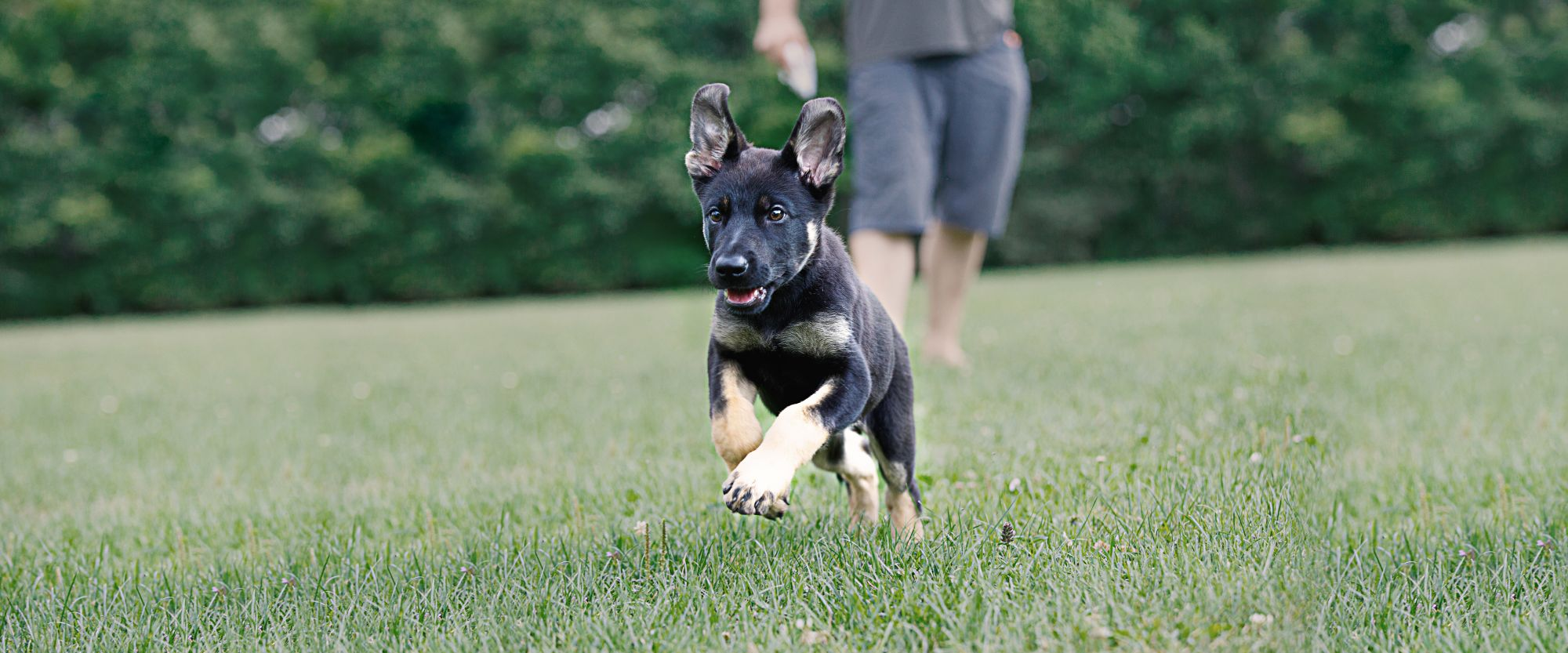7 Fun & Effective Tips to Bong with Your Puppy
Article

Through this article you can learn:
- Why it’s important to bond with your puppy
- 7 fun & effective ways to bond with your puppy
- How to train and discipline your puppy
An exciting journey has kicked off since you brought home a new puppy! Yet, similar to raising a newborn, it also means that owners have to take on new roles and more responsibilities. Since it takes time and effort to develop a strong bond with these little furry creatures, being patient and spending considerable time together is key to making your and your puppy become each other's best companions as they grow up.
Why it’s important to bond with your puppy
The emotional bond between a person and a dog is unique and can turn into a solid relationship as close as kin. But such intimacy is not built in a day. It needs time to grow, and a strong friendship is more likely to sprout if dogs are raised and trained at a young age.
Newly arrived puppies need to spend a few months getting familiar with their new home and all the strangers. At the same time, they might experience many rapid body changes during their growth. Hence, when your puppy seems slow in learning new things, remember to be patient and continue encouraging interactions.
As puppies usually need more attention and company from their owners, they grow better and develop greater physical and mental health with sufficient support and care.
7 fun & effective ways to bond with your puppy
Although nurturing any lifelong relationship takes time, there are still ways to facilitate your bonding journey with your puppy. Follow the 7 tips below to build a solid bond with your precious furry kid and connect on a deeper level.
- Create a sweet home
Your puppy might feel anxious or scared stepping into a new house for the first time. The best way to lower their guard is to set the stage for their arrival. You can preliminarily stock up on toys, treats, and anything else dogs genuinely love in the house. Or ensure the safety of each space by organizing electrical and drapery cords or covering up electrical outlets. In doing so, your puppy can then explore the new place with peace of mind and will not get negative first impressions of the new environment.
- Use a leash indoors
At a growing stage, puppies are usually too vulnerable to go for a walk and are significantly in need of constant guidance. However, you can start using a dog leash at home to take them around, making them familiarized with the view and smells of their new home. It allows the dog to get adapted to the experience of being led by a leash. Also, don’t forget to keep a close eye on them throughout the process for safety reasons.
- Know your puppy’s body language
Dogs cannot literally talk, but that doesn’t mean they are not good at expressing their needs. Their eyes, facial expressions, and body movements are all indicators of their emotions and feelings. For instance, if a puppy’s tail points down to the ground or is tucked between the legs, they might be in fear and full of stress. At the time, some instant encouragements are urgently needed. Watch your dog closely to catch the regular clues, read their body language, and respond to their needs accordingly.
- Communicate with your puppy
Apart from understanding your dog's demands, you also need to learn how to communicate with them. Puppies can be taught to comprehend specific commands and are sensitive to their owner's emotions and movements. By changing the tone of your voice, you can indeed communicate with your puppy. For example, if you want to raise your puppy's energy and motivate them to carry out a task, speak to them in a high-pitched, excited tone. Conversely, you can use a lower, steady tone to help your dog calm down or reduce anxiety.
- Arrange plenty of playtime
Having fun together is key to growing your bond with your puppy. When staying indoors, games such as “Hide and Seek”, “Tug”, and “Fetch” are helpful techniques to create more positive interaction. Yet, outdoor activities are still necessary. Whether it is going for walks or racing, puppies can benefit from regular exercise both physically and mentally. It not only prevents them from getting diseases like obesity, diabetes, or weak joints but also avoids disruptive behaviors such as unwanted barking and furniture chewing because of unbearable boredom.

6. Build trust through touching and cuddling
If your dog allows you to caress their abdomen, it shows a great deal of trust! By touching different parts of your dog’s body – including the ears, forehead, legs, belly, and backside – you can draw near to them and develop a sense of intimacy. When your puppy has not yet been familiar with touching and cuddling, you can try to give them some gentle massage when they are sleepy. In addition, learning how to cuddle your pet the right way can help them feel secure while being held in your arms.
7. Let your puppy sleep nearby
Depending on your dog’s size and temperament, you may prefer to put them in crates at the bedside or purchase a pet-sized bed to let them sleep right next to you. Whatever your final decision is, allowing your furry kids to rest with you in the bedroom can effectively lower their guard. Once your puppy is able to sleep pretty well near you, you have already earned their trust!
How to train and discipline your puppy
It is crucial to come up with basic house rules for your puppy as soon as possible. You will need to decide which types of activities are allowed and what boundaries you want to set for your puppy. Through such proper parenting and training, puppies are less likely to get into trouble or annoy their owners with nasty behaviors. As a result, you and your dog can fully enjoy life together and create more positive memories.
- Recommendations for puppy training:
- Impose routines to have regular mealtimes
- Train puppies to relieve themselves in particular areas
- Prohibit puppies from jumping around and taking up any space at home as they wish to prevent breaking things and chewing furniture
- Encourage puppies to follow the right instructions instead of overreacting to the behavior they already did
- Avoid hitting your puppy with your hands or an object as well as grabbing your puppy’s muzzle
As the proverb goes, “Love well, whip well” – parental love usually comes with a reasonable degree of discipline. The earlier you start training your puppies, the sooner they will know and respect the fact that you are the head of the family – someone they can completely trust and depend on.
Like & share this page